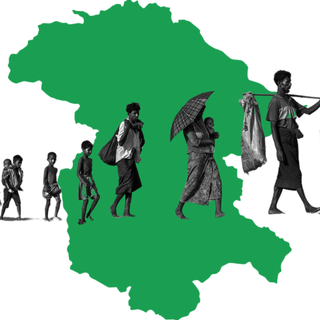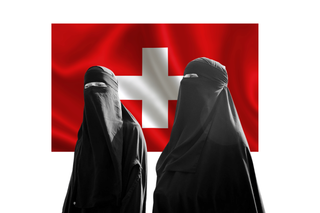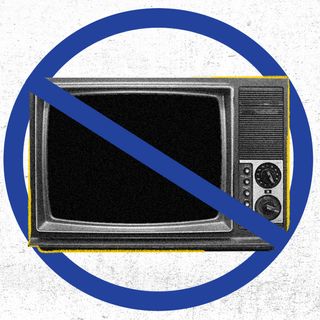
In Swiss Referendum, 51.2% of Voters Supported Ban on Face Coverings, Including Burqa, in Public Places
“What is aimed here is to stigmatize and marginalize Muslims even more.”

Switzerland voted narrowly in favor of banning face coverings in public areas, a move that will outlaw burqas and niqabs worn by Muslim women. Critics have branded the ban as sexist and Islamophobic, with the leading Swiss Islamic group calling it “a dark day” for Muslims.
The measure passed by a thin margin — 51.2% to 48.8% in Sunday’s referendum. The proposal, put forward by a group associated with the right-wing populist Swiss People’s Party (SVP), did not mention Islam directly and claimed to be directed towards violent street protesters who wore masks to evade legal scrutiny. However, the vote has been largely dubbed as “the burqa ban.”
Following the referendum, authorities have two years to chalk out detailed legislation. According to the proposal, the measure outlaws face coverings in common areas like restaurants, sports stadiums, public transport, and streets. Exceptions include places of worship and religio-cultural events, such as Carnival. Face coverings can also be worn for health reasons, such as masks to stop the spread of the novel coronavirus.
Switzerland follows European countries like France and Belgium in passing similar bans. The Swiss government has staunchly advocated against the measure, calling it excessive and unnecessary as full-face coverings are a “marginalized phenomenon” on Swiss streets.
Related on The Swaddle:
German Beach Volleyball Players Opt Out of Qatar Event Over Bikini Ban
The vote comes after years of debate in Switzerland following similar bans in other European countries, despite Muslim women wearing full-face veils being an exceptionally rare sight in the country. According to research by the University of Lucerne (in German), the burqa — a veil that covers the entire body with a mesh window over the eyes — enjoys little popularity in the nation. In comparison, the number of women wearing a niqab — head and face covering that leave the eyes bare — can be placed between 30 to 150.
The Swiss government and parliament have largely opposed the ban, arguing that the ban could spell trouble for the country’s tourism, as most women wearing burqas and niqabs are affluent tourists visiting the country from Persian Gulf nations. Moreover, the latest proposal was tabled before the coronavirus pandemic, which has translated into Swiss adults having to wear masks in many public settings.
Opposition against the ban falls along the intersection of gender, religion, security, and equality lines. National legislation dictating what women can and can’t wear has drawn fire from political and human rights groups, some calling it an affront to constitutional values.
While those in favor of the ban argue that such coverings symbolize repression of women and undermine the integrity of a free society like Switzerland, their arguments tacitly ignore pillars of religious freedom and women’s rights. “Anchoring dress codes in the constitution is not a liberation struggle for women but a step back into the past,” the Federation of Islamic Organizations in Switzerland said. Amnesty International has further termed the veil ban “a dangerous policy that violates women’s rights, including freedom of expression and religion.”
The move has been largely viewed as Islamophobic in its tone and tenor. The Islamic Central Council of Switzerland (ICCS) has called the result a “big disappointment for all Muslims born in Switzerland and who grew up here.” The vote “has succeeded in anchoring the widespread Islamophobia in Switzerland in the constitution,” noted Farah Ulucay, the secretary-general of the ICCS.
Muslims make up 5% of Switzerland’s population of almost 8.6 million people. While the SVP, which called for the referendum, said it seeks to ban all face coverings, BBC’s Imogen Foulkes noted that “their posters and literature said otherwise, showing threatening-looking women in black niqabs, and warning of Islamic extremism.” In recent days, Swiss cities have been plastered with posters reading “Stop radical Islam!” and “Stop extremism!” Foulkes added that SVP’s populist initiatives are often aimed at restricting asylum and immigration.
Switzerland has a direct democracy, meaning people have a direct say in decisions and are invited to vote on a spectrum of issues in national and regional referendums. Notably, Islam figured once before in a 2009 referendum, when citizens voted to ban the building of minarets, structures built adjacent to mosques. SVP initiated the proposal even back then and said such structures were a sign of Islamisation.
It is hard to say if yesterday’s referendum signals a rise in extremism in Switzerland since it passed on the back of a narrow margin. But the decision backs a religious community into a corner and has the potential to fuel fear and division.
“Today’s decision opens old wounds, further expands the principle of legal inequality, and sends a clear signal of exclusion to the Muslim minority,” the Central Council of Muslims said in a statement. The body plans to challenge the decision in court.
Saumya Kalia is an Associate Editor at The Swaddle. Her journalism and writing explore issues of social justice, digital sub-cultures, media ecosystem, literature, and memory as they cut across socio-cultural periods. You can reach her at @Saumya_Kalia.
Related


Bengaluru Court Bars Media From Airing ‘Defamatory’ News About BJP Ministers Involved in Job‑for‑Sex Scandal
